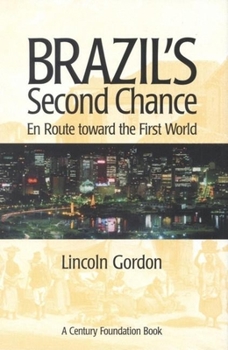Brazil's Second Chance: En Route Toward the First World
Brazil is currently in a critical phase of a decades-long transformation from a patrimonial society--based on the cultivation and export of sugar and coffee--to a modernized industrial and service economy with effective democratic governance. It is the world's fifth largest nation-state in area and population, and ranks eighth in total economic output. Since World War II, Brazil has been a leader in international trade governance and negotiation, playing an important part in development of the GATT and the WTO. Currently, the country is a major factor in negotiations toward a hemispherewide Free Trade Area of the Americas (FTAA). However, Brazil's political record in the past half century has been erratic and it has struggled with high inflation and balance-of-payment deficits. In this major new work, a former American ambassador to Brazil examines the social, political, and economic history of the country since the 1930s and discusses whether Brazil is now ready to assume a place as an important participant among First World nations.
"




